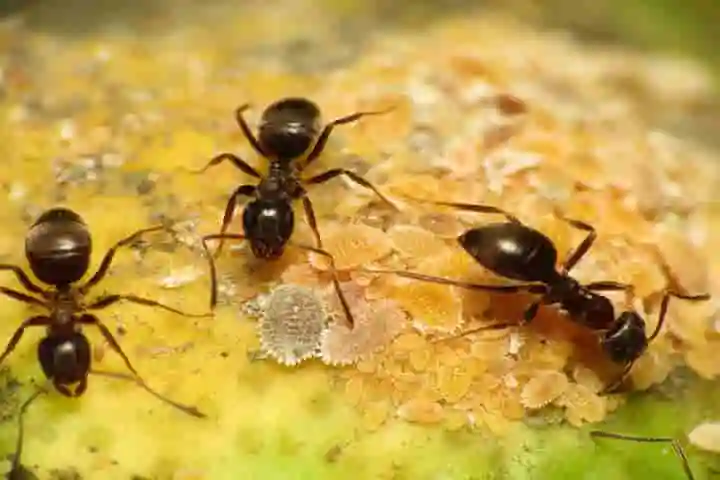

The study found that when among black garden ants, individuals are introduced that have fungal spores on them, then those that are not infected step away from each other (Pic. Courtesy wikimedia commons)
<p>
<strong>The pandemic Covid-19 has made phrase &ldquo;social distancing&rdquo; a buzz word all over the world but this practice has been there for longer than we think and it is present not just in humans but animals too.</strong></p>
<p>
Bringing this in limelight is a review paper that was published in Science according to a report in popsci.com, which looks at the shift in social behaviour among humans and animals during outbreak of disease.</p>
<p>
The study&rsquo;s lead author Sebastian Stockmaier told the media: <a href="https://www.popsci.com/story/animals/animal-kingdom-social-distancing-pandemic/">&ldquo;[Animals] have evolved really </a>interesting, intricate behavioural strategies to deal with pathogens.&rdquo; Stockmaier is a PhD candidate at the University of Texas, Austin, in integrative biology.</p>
<p>
The study&rsquo;s lead author Sebastian Stockmaier told the media: &ldquo;[Animals] have evolved really interesting, intricate behavioural strategies to deal with pathogens.&rdquo; Stockmaier is a PhD candidate at the University of Texas, Austin, in integrative biology.</p>
<p>
Teaming up with epidemiologists, evolutionary biologists, and other experts to write the review, Stockmaier investigated these social dynamics to comprehend how diseases spread and how viruses evolve.</p>
<p>
<strong>Also read: <a href="https://www.indianarrative.com/science-news/like-humans-dogs-too-suffer-from-hyperactive-impulsive-behaviour-122407.html">Like humans, dogs too suffer from hyperactive impulsive behaviour</a></strong></p>
<p>
Providing a gist of the study, Patricia Lopes who is a Chapman University assistant professor studying animal behaviour, wrote to Popular Science: &ldquo;What this review highlights is the multitude of ways in which the behaviour of infected individuals or of healthy individuals surrounded by infected individuals can change, and how we find these changes in a wide range of animals.&rdquo; She added that behaviour &ldquo;is a critical component in precisely determining or predicting how a disease will spread.&rdquo;</p>
<p>
Lopes, incidentally, was not part of the review.</p>
<p>
The researchers looked at eusocial insects like bees and ants to see how communicable diseases changed their social interactions. Stockmaier said, it was found across the species avoidance was common in them quite similar to humans backing out when somebody close to them sneezes. The practice of pathogen avoidance was found in lobsters, termites and Trinidadian guppies. &ldquo;That&rsquo;s a very beneficial behaviour, when you can recognize infection in somebody else, and you can avoid becoming infected,&rdquo; remarked Stockmaier.</p>
<p>
The aspect of self-isolation was also studied by the scientists. This can be done unintentionally as individuals aren&rsquo;t feeling well and unable to do routine activities or deliberately in order to protect others in their group like the bees and ants do.</p>
<p>
Besides, this the team also studied &ldquo;exclusion&rdquo; leading to quarantine or even the extreme end of this as in the case of honeybees &ndash; being dragged out of the nest, Stockmaier explained.</p>
<p>
The practice of caretaking &ndash; common in humans and social insects — as well as proactive distancing, that is avoiding contact even when healthy as a measure of precaution was also looked into.</p>
<p>
<strong>Also read: <a href="https://www.indianarrative.com/science-news/leprosy-mankind-s-age-old-scourge-affects-chimpanzees-too-reveals-an-international-study-121622.html">Leprosy, mankind&rsquo;s age-old scourge affects chimpanzees too, reveals an international study</a></strong></p>
<p>
Highlighting this Stockmaier noted: &ldquo;Something very similar has recently been shown in these black garden ants that do something very intriguing. If you introduce individuals that have these fungal spores on them, what will happen is that individuals inside the nest that are not infected will also step away from each other.&rdquo;</p>
<p>
Through this important review many other questions too have come to the fore said Lopes. For example, &ldquo;How can the pathogen try to manipulate our behaviour to increase its own survival and reproduction?&rdquo; She added that by probing as to&nbsp; &ldquo;how the behaviour of infected animals changes, how other animals detect sick animals, and what parts of these responses are driven by the pathogen versus driven by the infected individual&hellip;will increase our knowledge of how diseases move through populations and lead to improved public health policies.&rdquo;</p>
<p>
What makes the study absorbing is that animals don&rsquo;t have medical and science experts to guide and take precautions yet they do practice them. Wondering on these issues Stockmaier said: &ldquo;How do those ants know how to step away from each other? It&rsquo;s just fascinating that animals have evolved these strategies and use them, and that they&rsquo;re very effective.&rdquo;</p>
India and Maldives on Friday announced the initiation of negotiations for the launch of a…
Prime Minister Narendra Modi on Friday said that India has always been a close friend…
In a significant crackdown on objectionable digital content, the Ministry of Information and Broadcasting (MIB)…
India is signalling greater openness to Chinese investment in electronics manufacturing as bilateral relations show…
Defence Minister Rajnath Singh on Friday announced that India has conducted the successful flight trials…
Prime Minister Narendra Modi arrived in Maldives on Friday as a part of his second…